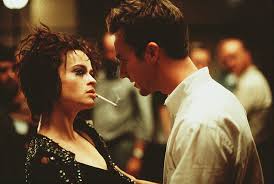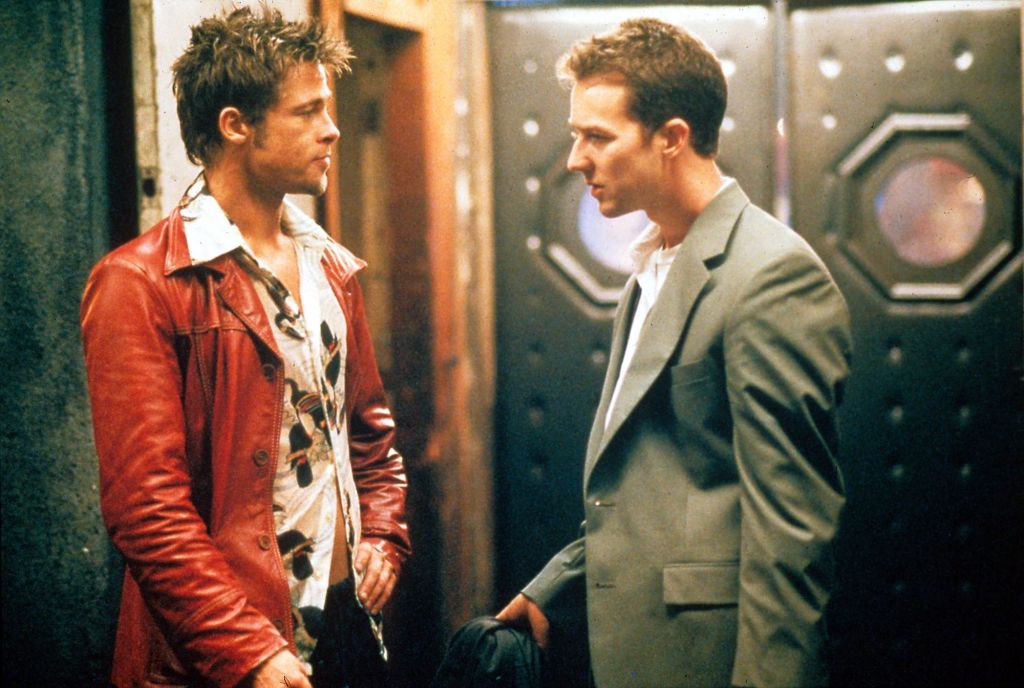The answer to that rhetorical question headline is “Yeah, pretty much.”
David Fincher’s brutal, sprawling fever-dream of Incel America can seem prescient, 22 years after its release.
It crossed over into cult status sometime before the lunatic right embraced its anarchy, toxic masculinity and division of huMANity between those who submit to the pain of life and embrace violence as a means of changing it, and “snowflakes.”
“You are not special. You are not a beautiful or unique snowflake.”
“Fight Club” embedded itself in the culture with its swagger, bravado and catch phrases.
“The first rule of Fight Club is: you do not talk about Fight Club. The second rule of Fight Club is: you DO NOT talk about Fight Club!”
Watching the film now, post Jan. 6 2021, it’s hard to see in the same visceral if seriously troubling way it washed over us all on first viewing. The satiric, stumbling narrative still stings, but the sting is no longer particularly funny.
It felt 30 minutes too long in 1999. It plays closer to “interminable” now.
Edward Norton’s insurance recall assessment agent, drowning in a pitilessly amoral job that reduces his life to frustrating air travel, soul-crushing car accident analysis and an IKEA-furnished “nest” at home, is by most measures Incel Patient Zero. No, he’s not unattractive, morbidly obese and living in the cliched “Mom’s basement.” But Incel he is, so numbed that he starts crashing support groups — testicular cancer to TB — just to “feel” something, to unload his suppressed Life of Tears.
Meeting a fellow support group crasher (Helena Bonham Carter at her Goth-punk sexpot best) doesn’t help. But this swaggering hunk Tyler Durden does. He’s “don’t give a f—” America incarnate — all bravado and attitude, willing to take a punch and more than willing to deliver one.
Whatever else once-and-always pretty boy Brad Pitt has done on the screen, this is the role that defines him. And who is he defining? Tyler’s a craft soap maker (Holocaust allusion) and banquet waiter who pees in the soup he serves the well-heeled.
Tyler Durden is still walking among us, refusing to “socially distance,” that “ass without a mask.” He is quick to trigger, quicker to feel dismissed, quick to turn violent. He is an icon to just the sort of people who ruined this movie, the ones who filled (more than one seat each) a commuter train I took in Orlando a year or so ago — uniformed and uniformly obese pasty-faced Proud Boys on their way to a Trump rally. I was taking the same train to see the Baby Trump balloon. Go figure.
When The Narrator of Many Fake Names (Norton, often speaking to the camera) and Tyler Durden invent Fight Club as a release for the similarly-disaffected, Tyler is the one who gets the girl. The Narrator finds himself surrounded by Incels, the emasculated looking for masculine meaning — pain, honor, glory, belonging to something larger than themselves.
Last summer’s riots, with much of the rioting organized by masked and tac-geared-up Boogaloo Boys, was “Fight Club’s” coda, an epilogue to the organized mass destruction that the Project Mayhem offshoot of Fight Club delivers in its finale.
I think David Fincher and novelist Chuck Palahniuk were prophetically reading the tea leaves rather than “inspiring” the cretins who adopted this movie as their ideal. Scorsese didn’t invent the mob, but his mob pictures provably influenced mob behavior, mores and social acceptance. That’s where “Fight Club” sits — a socially prescient social hot button film that was a magnet for disaffected, struggling white guys who wanted to see an idealized, buff and quotably flippant version of how they imagined themselves.
“We are all part of the same compost heap,” Durden aphorizes. “I see all this potential, and I see squandering. God damn it, an entire generation pumping gas, waiting tables; slaves with white collars. Advertising has us chasing cars and clothes, working jobs we hate so we can buy shit we don’t need. We’re the middle children of history, man. No purpose or place. We have no Great War. No Great Depression. Our Great War’s a spiritual war… our Great Depression is our lives. “
The film tapped into what was, 17 years later, to make Trump president and 20 years later would lead to the sacking of the capital.
Aside from prophecy, how’s the film hold up? The grimy design, runway ready gaucherie of Durden’s look, attire and that Camaro convertible he peels off in for his airport exit is all of a piece. It’s ugly-beautiful.
The performances are spot-on, a hallmark of Fincher’s pictures. Norton’s reputation for immersion in a part predates this film, but it was chiseled in stone after it.
The narrative? It’s a tad sloppy and ambling. The picture unravels in pretty much the way the narrator does, with a third act that feels inevitable and unearned, “just right” and ridiculously “on the nose.”
And while there are jaw-dropping surprises along the way, the picture’s look and tone give away the biggest “twist,” then and now.
I remember wincing at what I thought were its flaws, way back when. Seeing “Fight Club” again, post-Jan. 6, they stick out more.
Cult films are seldom great films, they just connect with a corner of the audience more intensely than was intended, elevating their status.
That’s “Fight Club.” And appealing to the wrong sort of cult just makes that clearer.
MPAA Rating: R for disturbing and graphic depiction of violent anti-social behavior, sexuality and language
Cast: Edward Norton, Brad Pitt, Helena Bonham Carter and Meat Loaf.
Credits: Directed by David Fincher, script by Jim Uhls, based on the Chuck Palahniuk. A 20th Century Fox release.
Running time: 2:19






